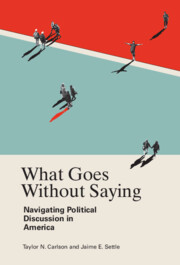Book contents
- What Goes Without Saying
- What Goes Without Saying
- Copyright page
- Contents
- Figures
- Tables
- Acknowledgements
- 1 Opening the Black Box of Political Discussion
- 2 The 4D Framework of Political Discussion
- 3 Data Collection
- 4 Detection
- 5 Decision
- 6 Discussion
- 7 [further] Discussion
- 8 Determination
- 9 Individual Dispositions and the 4D Framework
- 10 The Costs of Conversation
- Notes
- Works Cited
- Index
7 - [further] Discussion
Expression in Political Discussions (Stage 3)
Published online by Cambridge University Press: 26 May 2022
- What Goes Without Saying
- What Goes Without Saying
- Copyright page
- Contents
- Figures
- Tables
- Acknowledgements
- 1 Opening the Black Box of Political Discussion
- 2 The 4D Framework of Political Discussion
- 3 Data Collection
- 4 Detection
- 5 Decision
- 6 Discussion
- 7 [further] Discussion
- 8 Determination
- 9 Individual Dispositions and the 4D Framework
- 10 The Costs of Conversation
- Notes
- Works Cited
- Index
Summary
Chapter 7 continues our examination of the Discussion stage (Stage 3) of the 4D Framework, aiming to better understand what people actually verbally express in political conversations. We use a series of vignette experiments and a lab experiment to examine the extent to which people express their true opinions to the group, or engage in other expressive behaviors like self-censorship, silencing, or conformity. We find lab experimental evidence of conformity in real conversations and our vignette experiments revealed that individuals were less likely to reveal their real opinions when they were in the political minority and when they were less knowledgeable. We also find that individuals who were less knowledgeable were more likely to have affiliation concerns that explained their expression behavior. Finally, we analyzed the transcripts from the conversations in the Psychophysiological Experience Study to examine variation in what and how individuals discussed politics. We found that weak partisans were most likely to "hedge" their language when revealing their opinions and political identities.
Keywords
- Type
- Chapter
- Information
- What Goes Without SayingNavigating Political Discussion in America, pp. 154 - 179Publisher: Cambridge University PressPrint publication year: 2022



